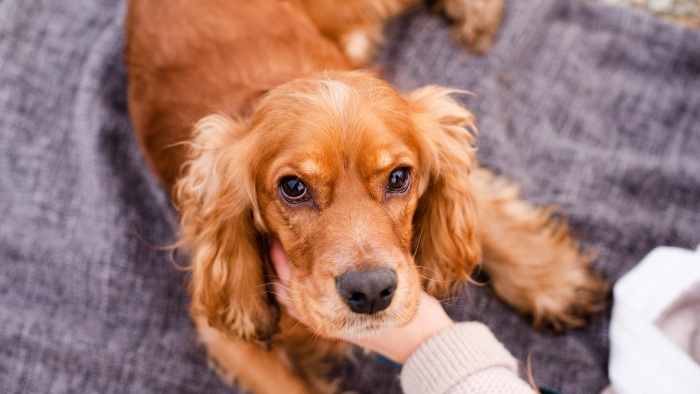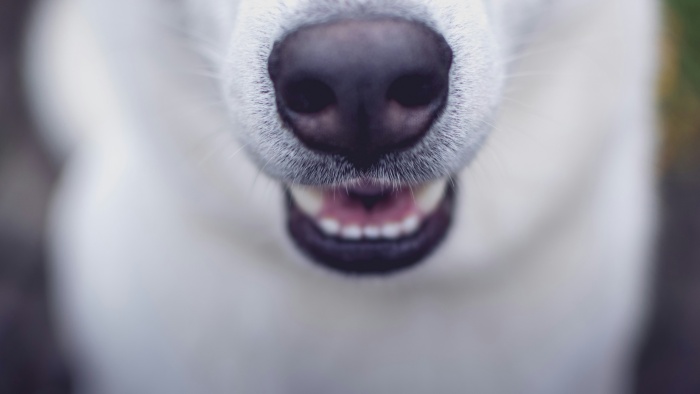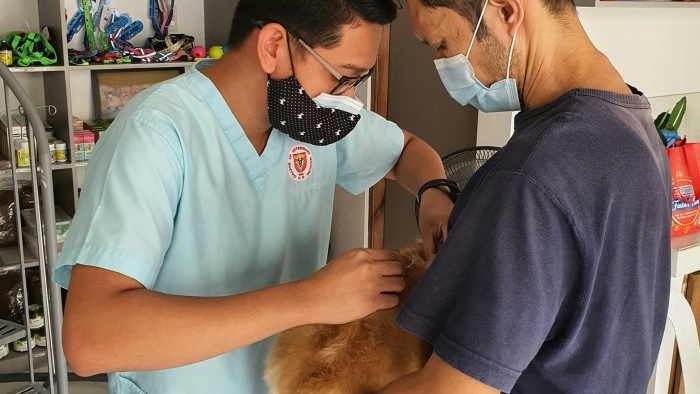Dog Swollen Face:Reasons And Solutions

When you notice a dog swollen face , it often signals a significant health issue beneath the surface. Our veterinarians in Central Illinois shed light on critical illnesses that may manifest through facial swelling in canines.

Factors leading to facial swelling in canines
Various reasons can lead to facial swelling in dogs, ranging from minor issues that can be resolved with a vet visit to more severe health problems like tumors. Facial swelling in dogs often indicates deeper health challenges, typically accompanied by other symptoms such as decreased appetite and fatigue.
Allergic responses
The primary cause of facial swelling in dogs is allergic reactions. Potential allergens include bee stings, medications, specific foods, vaccines, exposure to toxins, pollen, and insect bites, all of which can cause swelling in a dog’s face. While mild allergic reactions may improve with little to no treatment, severe reactions need urgent veterinary care.
These allergic reactions provoke an inflammatory response, resulting in hives and facial swelling, particularly noticeable around the eyelids and nose. Signs of discomfort or reddish skin may also indicate that a dog is experiencing an allergic reaction.
Dental issues and facial swelling
Dental problems are also a common cause of facial swelling in dogs. Infections, such as tooth abscesses beneath the gum line, can form pus-filled pockets that cause swelling.

Oral injuries, broken teeth, and gum disease are additional dental issues that can lead to facial swelling in dogs.
Injury-induced swelling
Physical trauma can cause facial swelling in dogs, just as in humans. Injuries from falls or animal bites are common reasons for a dog’s swollen face.
Growth-related swelling
Both benign and malignant growths can lead to facial swelling as they expand on a dog’s face or head. Tumors can create discomfort and pressure and may indicate cancer, urging prompt veterinary consultation.
Additionally, cysts, which are fluid-filled sacs, can appear as swelling. Though usually benign, cysts need attention if they reach a size that cannot be ignored.
Strategies to avoid swelling in your dog’s face
Is your canine companion prone to allergies? If yes, it’s crucial to limit their exposure to known allergens that could provoke a response. Your veterinarian might suggest using antihistamines to help prevent facial swelling.
Inform your veterinarian about any past vaccine reactions, including facial swelling, so your dog can receive preemptive care to lessen the severity of the reaction. Immediate treatment with an antihistamine is advised if your dog is stung by a bee, bitten by an insect, or exposed to any environmental allergen. Consult your vet for proper guidance.

Preventing dental issues largely involves regular veterinary checkups and consistent home care for your dog’s teeth. Establish a home dental care regimen to diminish the risk of dental problems, enhancing the chances of early detection of potential issues.
Although preventing trauma entirely may not be possible, adhering to safety precautions can reduce risks. Ensure your dog is leashed or in a secured area when outside and supervise interactions with other animals to avoid aggressive encounters. Seek veterinary care immediately if your dog experiences any form of trauma.
While it’s unfortunate, cancer and tumor prevention is not always feasible. However, early recognition and treatment can mitigate the impact on your dog’s health.
Prompt action is vital if you observe swelling in your dog’s face, emphasizing the importance of quick response and veterinary consultation.
Conclusion
A dog swollen face is a clear indicator of potential health issues that require immediate attention. From allergic reactions to dental problems, trauma, and even tumors, the causes of facial swelling in dogs are varied and can have significant implications for their overall health.
Proactive measures, such as minimizing exposure to allergens, maintaining dental hygiene, ensuring safety during play, and regular veterinary check-ups, are essential in preventing such issues.
However, should you observe swelling in your dog’s face, it’s imperative to act swiftly and consult with your veterinarian to address the underlying cause and safeguard your pet’s health.
FAQs
Can diet play a role in preventing facial swelling in dogs?
Yes, a well-balanced diet can help prevent facial swelling by supporting a dog’s overall health and immune system. For dogs prone to allergies, feeding them hypoallergenic or limited ingredient diets can reduce the risk of allergic reactions that may lead to swelling. Consult with your vet to determine the best dietary options for your pet’s specific needs.
How often should I check my dog for signs of swelling or other health issues?
Regularly monitoring your dog’s health is crucial. Conduct a weekly health check to look for any signs of swelling, discomfort, or other abnormalities. Pay special attention to their face, mouth, and any areas previously affected by swelling or injury. Early detection is key to addressing health issues promptly.
What are some first aid tips for managing minor facial swelling at home?
For minor swelling, applying a cold compress can help reduce inflammation. However, it’s important to first identify the cause of the swelling. If it’s due to an allergic reaction, your vet may recommend administering an over-the-counter antihistamine, based on your dog’s weight and health status. Always consult your vet before giving any medication.
Are there any specific breeds more susceptible to facial swelling?
Some dog breeds with shorter snouts, such as Bulldogs, Boxers, and Pugs, may be more prone to certain health issues that can lead to facial swelling, including respiratory difficulties and dental problems due to their constricted jaw structure. Regular vet check-ups can help manage breed-specific health risks.
Can using a harness help prevent injuries that lead to facial swelling?
Absolutely. A well-fitted harness can prevent injuries by distributing pressure more evenly around the dog’s body instead of concentrating it on the neck and face, which is particularly useful for dogs that pull on their leash. This can reduce the risk of trauma and subsequent swelling caused by collars pulling against the throat and neck area. Always choose a harness that suits your dog’s size and activity level for optimal safety and comfort.

